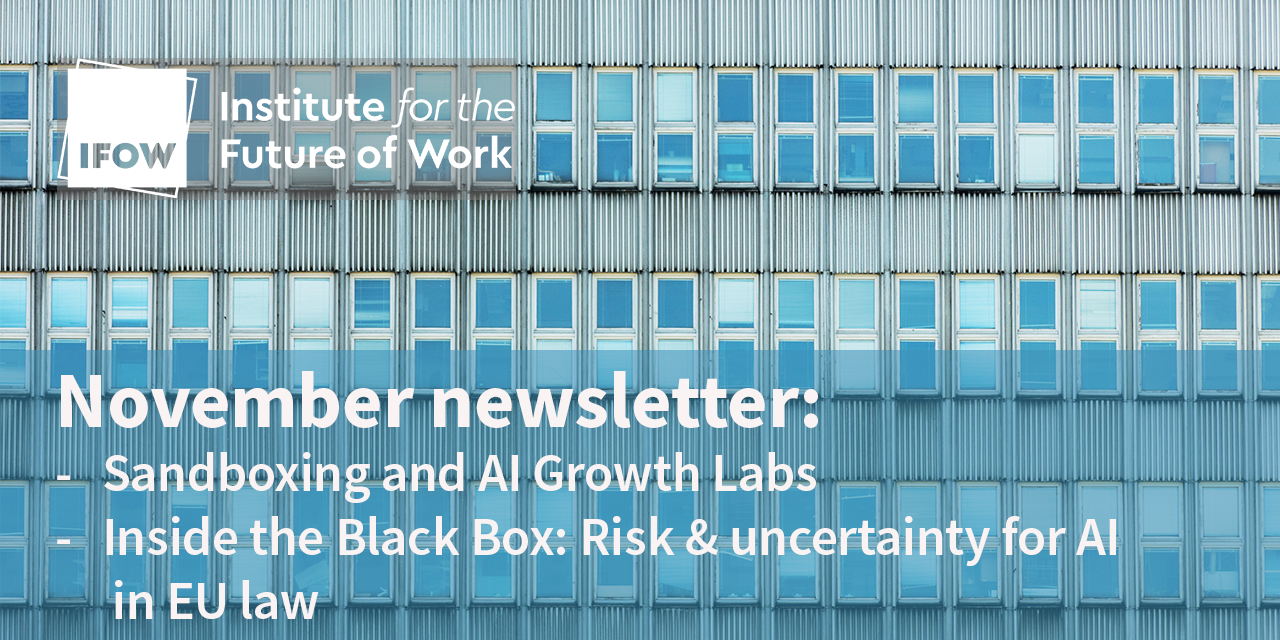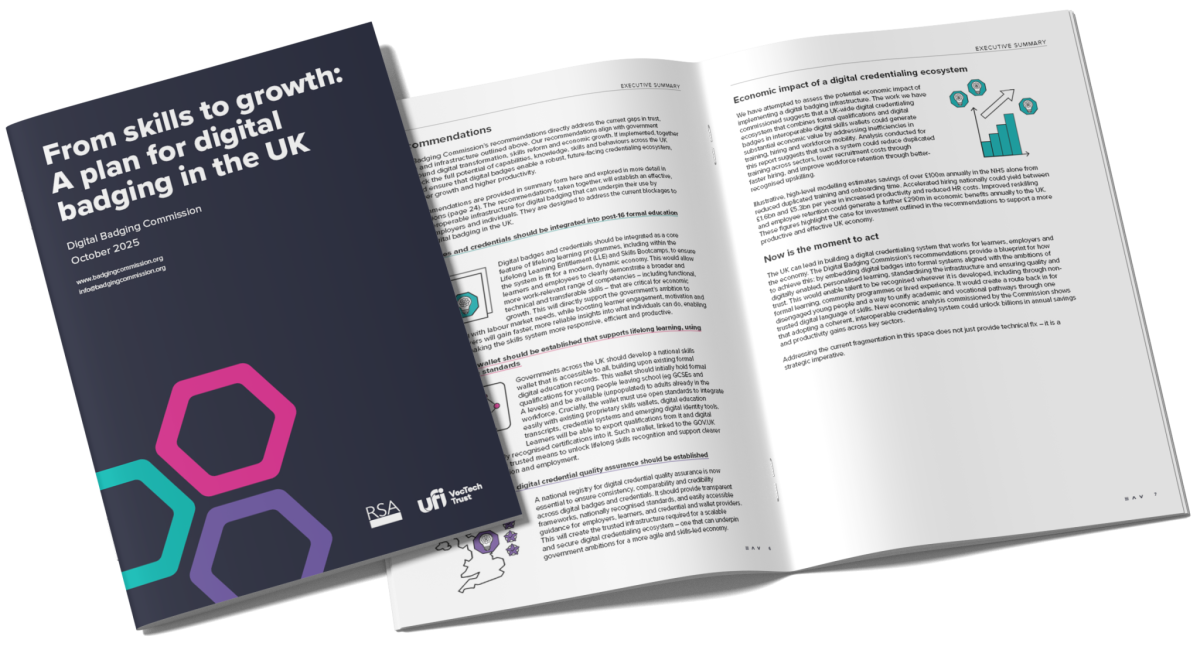We use cookies to personalise and enhance your experience on this site. By clicking Accept or continuing to use the site, you agree to our use of marketing and social media cookies as described in our Privacy Policy.
Accept and close
Even as talk of an ‘AI bubble’ has resurfaced, the UK government has announced new R&D commitments, an AI Skills Framework, and AI Growth Labs – which IFOW Co-Exec Director Dr Abby Gilbert explores in our deep dive below. But how can these investments (and the upcoming budget) steer towards creating good, local jobs across the country?
Forthcoming work from us this month reaches across sectors, from GenAI’s impact on the novel, to the latest in our project with the EY Foundation on helping young people from low-income backgrounds looking to access better jobs. We also have an excellent blog piece from our Senior Research Fellow, Professor Phoebe Moore, on opening the ‘black box’ of risk and uncertainty in AI models.
We will be offering our reflections on the important budget towards the end of the month, as well as news of a major conference in the spring. Until then, we hope you enjoy our curated list of reads and events.
Anna and IFOW Team
Last week, the Government released a new call for evidence on their proposal for AI Growth Labs. This sets out a strategy to accelerate AI sector growth within the UK. Building on our established national credentials and experience in Sandboxing, the government is proposing these environments are used to unlock investment in UK tech start-ups by ‘lifting unnecessary legal barriers’ without compromising on human rights, and ‘red line’ areas of law - within which, worker’s protections are included. Beyond a national effort, proposals are made for place-based regulatory sandboxes - working alongside innovation accelerators – which we directly proposed in our policy recommendations from the IFOW Pissarides Review.
The proposed focus on innovators tracks the UK’s history of sandboxing. However, developments – and differences from the current EU approach – include the move to explore systems ‘operating in live market environments’. This stands in contrast to ‘conformity’ assessment approaches, which require new products to be tested before and in order to gain access to markets. While this might sound like a risk, in practice this recognises the widespread and rapid adoption of these tools. Further, as our own work in the IFOW Sandbox shows, it is only through understanding real-world deployment that practical risks can be meaningfully understood.
Beyond deregulation, the proposal also suggests the role of Sandboxing to assist more ‘dynamic regulation’, accepting that these spaces can be used to shape future protections. At IFOW, we see Sandboxing as a tool to address uncertainty, weak interoperability or gaps in legal frameworks, regulation and governance. Sandboxing can be used to provide clarity and surface key evidence on interactions before, during, or after legislation is enacted, making sure that innovation and governance are dually strengthened in real time.
While clarifying that employment laws will not be relaxed, the current proposal does not focus on work. Sectors mentioned include health, planning and robotics. The proposal does mention that design will allow for understanding multi-regulator domains, but how is still under development.
As our work highlights, work is not a sector, but a cross-cutting, highly specific legal, regulatory, and cultural domain where people are extensively exposed to new technologies, and which requires a specific approach to study. The IFOW Sandbox is the first globally to consider the workplace a domain of interest. Work is also a space within which key areas of focus beyond employment law, considered in the new proposal – such as on Sovereign AI – are shaped. Stay tuned for our forthcoming Year 1 Sandbox Exit Report.
Inside the Black Box: Risk and uncertainty for AI in EU law | Senior IFOW Research Fellow Professor Phoebe Moore

In a new blog post for IFOW, Professor Moore explores the unpredictability at the centre of AI, asking the question – how much, and indeed how can – uncertainty be tolerated in legal and compliance frameworks when it comes to regulating AI?
The value of Research & Development | Department of Science, Innovation and Technology
For every £1 the Government invests in public R&D, £8 is generated in the long-term for the UK, according to this recent analysis by DSIT. This insight comes as a £55 billion funding boost for R&D is announced, aimed at creating higher-quality jobs and growing the economy.
However, as evidenced by the Disruption Index in our Pissarides Review, the picture on R&D investment and Venture Capital flows has been one of major regional inequalities. If we are to build a fairer future of better work, it is vital that public R&D models this balance so that good, local jobs are created right across the country.
Jobs of tomorrow: Technology and the future of the world’s largest workforces | World Economic Forum

The future of work means more than examining the impact of generative AI and LLMs on white-collar roles. WEF’s new report shows how technologies including robotics, energy technologies, and networking and sensing technologies, are reshaping the world’s largest workforces, from agriculture to healthcare.
Our Good Work Algorithmic Impact Assessment provides guidance for employers on how to involve workers in evaluating the use of algorithmic systems in the workplace.
Politics of the prompt: Government in the age of generative AI
Can LLM prompting be deemed a new expression of political sway? This paperconsiders prompt engineering in government departments alongside the language of politics and critique. While the impacts of AI on the labour market can often dominate headlines, our research also unpacks how the implementation of new technologies can alter the nature and condition of work, generating different work outcomes.
Increasing job security: The potential impact of employment rights reforms in the UK | Work Foundation
Work insecurity has been an ongoing feature of the UK labour market for over two decades. This recent report from the Work Foundation estimates levels of job insecurity in 2023, and how they might have been reduced, had two key aspects of the ongoing Employment Rights Bill – day one rights and minimum hours – been in place.
As well providing fair pay and conditions, good work must also promote dignity, autonomy, and equality, supporting people to properly develop their talents and have a sense of community.
From skills to growth: A plan for digital badging in the UK | Digital Badging Commission, with Ufi VocTech Trust and RSA

The UK is home to rich reserves of energy, ambition and creativity, but lacks a proficient skills-recognition system to track these talents. This report sets out how a national digital badging infrastructure would support access to good work, boosting productivity and growth across the country.
Digital badge accreditations also hold strong potential to support learners and job seekers, such as those in our Flourish project, by encouraging personal growth and building internal confidence.
What should an auditing system for AI look like? The Data Lab Community
What does inclusive auditing look like? This recorded webinar unpacks recent research on holistic, participatory tools for AI auditing.
AI assistants misrepresent news content 45% of the time | European Broadcasting Union (EBU) and BBC

Newsrooms are hurrying to experiment with new technologies like AI summaries, explainers and even personalised news-related content into their work streams, particularly given the decline in engagement with institutional media.
In this report, the largest international study of its kind, the BBC and EBU warn of the accuracy risks of over relying on AI assistants – applicable to both news providers and consumers.
Two-thirds of UK firms gain from AI – Reskilling key to unlocking greater productivity | IBM
67% of UK business leaders say internal resistance and cultural barriers are stalling the rollout of AI pilots, according to this research by IBM.
Our research shows that successful technological adoption in workplaces rests on fully engaged human management and a foregrounding of workplace cultures. This report unpicks how new technologies like AI are altering established cultures of work – and what this means for workers and workplace environments.
Generative AI: A solution to skills challenge? | 05 November 2025, online
How are SMEs using generative AI today? Can it help address labour and skill challenges? How can SMEs strike the right balance between automation and human expertise? Join this Digit Debate to hear the latest evidence from a new report on Generative AI and the SME workforce.
How devolution can help improve transport connectivity - IfG DevoLab | 06 November 2025, hybrid

This third installation of IfG’s DevoLabs, an initiative exploring innovations enabled by devolution, sets out how the powers and profile of mayors are being used to improve transport connectivity within and between their regions.
Structural inequalities like transport connectivity must be addressed in order to ensure fair, regional access to good work, and to combat the polarisation of work, society and democracy.
Interdisciplinary inquiry and collaborative experimentation: Lessons from the AI & Arts Group | 08 November 2025, in-person
How do we create space for collective en-visioning and experimentation at the intersection of AI and the arts? In this panel, representatives from the Alan Turing AI & Arts Interest Group, including from IFOW, will respond to this provocation and explore pressing questions at the intersection of AI, art, and society.
European Commission - Apply AI webinars | Starting 12 November 2025, online
This series of Apply AI webinars, aimed industry and the public sector, promote AI adoption and showcase how AI can enhance competition and technological sovereignty. The first session outlines the AI First policy behind the Apply AI strategy.
The impact of generative AI on the novel: report launch | 20 November 2025, online
The UK’s creative industries, of which novels form the cornerstone, are essential to our cultural and economic life, contributing £126bn gross value annually, along with an abundance of soft power.
Join us for the webinar launch of this highly-anticipated report, examining how the impact of generative AI on literary creatives, their work and incomes, their hopes and fears for the future, and what measures the Government must implement to protect the UK’s precious literary scene.